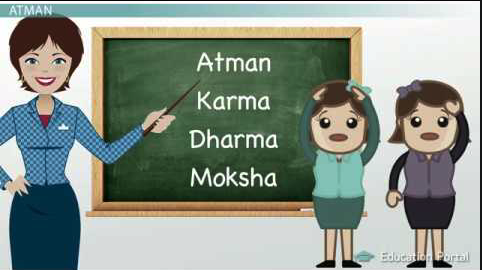Simple answers to your questions on Hinduism are provided here.
Use the search button (top right on desktop, top left on smartphones) to find specific topics of interest. At the bottom of each answer, check the “Tags” section for related topics. To learn more about this Q&A project, click [here].

On Hinduism
You can also download an earlier collection: 300QAs on Hinduism (PDF). Thank you.

19. Hindu Life
Hindu daily rituals include Pancha Karma (5 coveted aspects):
- Taking shower (ablution)
- Meditate (controlled breathing, mantra chanting)
- Tarpan (offering to God, guru, ancestors): Could include water, food, lamp-lighting, incense, creating a pious environment
- Yoga: Establishing connection between mind, body, and higher learning
- Contemplation (focused deliberation, self-reflection)
The 7 days of the week are dedicated to invoking various virtues via worshipping energy sources (manifestation of Shiva for cosmic & inner balance, manifestation of Lakshmi for expansive prosperity via pious means, manifestation of Sun for vital energy, etc).
Other reading material: Atharva Veda
Relevant videos:
Contributor: Soma Chatterjee
Location of this post (19a): https://www.hinduspeakers.org/ufaqs/are-there-hindus-daily-and-weekly-rituals/
Kids mostly receive education on festivals like Diwali and Holi, chanting daily slokas, doing Arti and attending a local temple on special religious occasions.
Children receive education about Hinduism mainly through their parents (first guru) and temples. Nowadays, parents try to teach Hinduism in a practical way so that children understand the purpose and meaning behind it and then relate and apply it in their life (for example, character building). Temples offer educational programs such as balvihar classes (language and cultural).
Many parents have a prayer altar at home to pray or worship together daily. Other more committed parents teach them devotional song, chanting, reading from holy books, performing yoga and meditation.
Other reading material: https://www.hinduismtoday.com/archives/2007/1-3/pdf/section-2_2007-01-01_p17-45.pdf
Relevant videos: https://www.youtube.com/watch?v=Tt62SIjuv7Y&t=31s
Contributor: Monita Sharma
Location of this post (19b): https://www.hinduspeakers.org/ufaqs/what-kind-of-education-do-your-kids-receive-about-hinduism/
Desire is born out of attachment that human beings have with the material world. This material world is perceived by human senses. Therefore, desire is natural.
Eastern wisdom – especially in Hinduism, Buddhism and Jainism – has highlighted the absolute absence of all (personal) desires as the hallmark of the highest spiritual wisdom. Upanishads declare that desire is the sign of ignorance (avidyā), and arises from the false sense of incompleteness (apoornatā).
Swami Visharadananda writes, “Why do we have desires? Because we tend to identify ourselves with our body-mind ego or body-mind adjuncts/appearance (upādhi). We forget our divine nature, our atman-nature which is ever fulfilled and free from all worldly needs.”
The enlightened man, who has higher knowledge (vidyā), feels complete (poorna) and therefore has no need for seeking pleasure or for acquiring any object.
akāmo nishkāma āptakāma ātmakāmo
na tasya prānā utkrāmanti
brahma eva san, brahma āpnoti
Free of want, devoid of desire, having all his desires fulfilled,
delighting in the Self alone, this man is Brahman;
he attains Brahman. His energies do not lead to another birth.
(Brihadāranyaka Upanishad, 4.4.6).
Other reading material:
Relevant videos:
Contributor: Jyoti Lulla
Location of this page (:19c): https://www.hinduspeakers.org/ufaqs/why-do-we-have-desires-and-how-to-control-them/
Religion is an integral part of a Hindu’s daily and weekly life. Most Hindus maintain a small shrine (altar) at home, where they pray or meditate—often early in the morning—to feel grounded and begin the day with a positive mindset. Many also visit temples regularly, where they find not only worship but also community activities such as children’s language classes, study of scriptures like the Bhagavad Gita, and various educational and cultural programs.
During festivals such as Diwali, Holi, and Navratri, Hindus gather in large numbers for celebrations that can last several days. Many also join havan groups, meditation circles, or chanting clubs, which provide both spiritual support and social bonding.
Equally important are everyday values drawn from the Dharma Shastras and the Vedas. These include speaking the truth, practicing ahimsa (nonviolence) and often vegetarianism, respecting parents, teachers, elders, and the wise, and greeting others with folded hands and “Namaste.” These are not tied to a strict daily or weekly schedule—they are woven into the fabric of life, guiding Hindus in all times and settings.
Contributor: Mukta Vadera
Location of this post (19d): https://www.hinduspeakers.org/ufaqs/how-does-your-religion-play-into-your-life-daily-weekly/
Hindus have an ethics framework and recommendations but do not have the commandments. They rather have the do’s and don’ts–ten of each. These are called the yamas (restraints) and niyamas (practices). Collectively, these are the code of conduct for Hindus. Restraints are non-injury, truthfulness, non-stealing, divine conduct, patience, compassion, steadfastness, honesty, purity, and moderate appetite. Practices are observances that are a derivative of the restraints. Hindu Ethics are enshrined in the Vedas and Smritis. They were also practically demonstrated by God Himself in the Itihasas and Puranas. Hindu ethics are rooted in these 10 restraints.
Other reading material: https://houseoflac.wordpress.com/2020/09/06/25-yama-and-niyama/
Relevant videos
Contributor: Rajeev Singh
Location of this post (19e): https://www.hinduspeakers.org/ufaqs/what-are-hinduisms-ethical-and-legal-rules/
